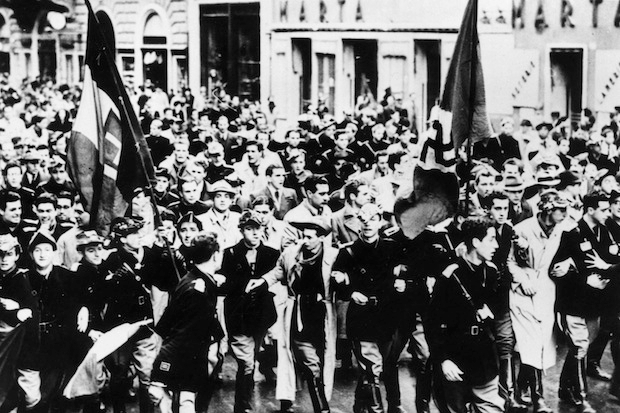Italy entered the second world war in circumstances very similar to those in which it signed up for the first. Its leaders waited for nine months after the outbreak until they thought they had identified the winner and extracted promises of territorial rewards. In 1915 they guessed rightly and attacked Austria, their formal ally for the past 33 years, and they seemed to have chosen correctly again in June 1940, when France was already beaten and the British had evacuated Dunkirk.
Italy’s new enemies were even older allies than Austria. Without the military aid of the French and the diplomatic support of Britain, Italy would never have become unified between 1859 and 1870. Generations of friendship, untarnished at least until Mussolini’s invasion of Ethiopia in 1935, made it almost impossible for the British to think of Italy as a potential military foe. With neither historical rancour nor contemporary rivalry to fuel a sense of antagonism, British diplomats and intelligence officers had felt no need even during the fascist years to make contingency plans for war. The consequence, as Roderick Bailey points out in Target: Italy, was ‘the shallow and amateurish nature of…clandestine resources’ and ‘the subsequent snail-like pace of progress towards targeting Italy’ secretly.
Special Operations Executive (SOE) began its Italian work in July 1940 and soon realised how much more difficult it was to function in an enemy country than in territory (such as France or Holland) occupied by an enemy power. Plenty of Italians might dislike the fascist regime, but very few were prepared to betray their country, risk their lives or kill their compatriots. British officers would thus trawl through their thousands of Italian captives in Africa and the Middle East and duly discover that the vast majority of them preferred to remain prisoners rather than be parachuted into Italy; the few that did volunteer were almost invariably judged to be ‘unsuitable’ or ‘unreliable’.
Italy was thus neither SOE’s most fertile terrain nor a place for persistent and heroic drama. Familar figures such as Ignazio Silone and Emilio Lussu, Richard Newby and Peter Fleming, flicker in Bailey’s narrative but then disappear without adding anything substantial to the story of the organisation. There is a vague plan to poison Mussolini, and another one to assassinate Farinacci, one of Fascism’s champion thugs, but, like most of the projects described in this work, implementation is not attempted. Authorial comments such as ‘the plan came to nothing‘ or ‘once again little came of it‘ become the book’s refrain.
The SOE operations that did take place had a distressingly low success rate. An Italian waiter at a London hotel is parachuted in to help blow up the Aquedotto Pugliese, but he is soon captured and executed; in what one SOE officer predicts will be ‘more or less a suicide job’, two Italians are landed on Sicily’s east coast where they are also quickly captured and shot; two more agents are made prisoners as soon as they reach a beach in Sardinia, whereupon they are cleverly exploited by the Servizio Informazione Militare (SIM); later an Englishman is arrested after parachuting into Lake Como — of all visibly unsubtle places — but he survives and in a remarkable display of bluff later convinces a German commander that he is an emissary of General Alexander.
Eventually, miraculously, a scheme seems to succeed. SOE’s man in Switzerland, a Scot called McCaffery, opens a channel into northern Italy through which he sends large quantitites of explosives to his agents. Soon he is receiving gratifying reports of successful acts of sabotage carried out by a group of resistance fighters called the Tigrotti: ships sunk, trains derailed and factories set alight. But alas it transpires that all this is just a mirage. The agents belong to SIM, the sabotage is a fiction, and the Tigrotti do not even exist: they are an amusing invention of the Italians who, whatever their deficiencies on the battlefield, have outsmarted McCaffery and their other counterparts in British Intelligence.
Roderick Bailey is a fine historian who has researched his subject and given his tale a strong narrative drive. Unfortunately there are only two plausible heroes in his story: Mallaby, the Englishman parachuted into Lake Como, and Sarfatti, a Jewish Tuscan wireless operator who survived the war and happily ended his career as professor of botany at the University of Siena. Of the others he writes with sympathy — especially of Picchi, the poor London waiter — without making great claims about their importance or their effectiveness; he knows that SOE did not achieve a great deal in Italy.
Yet he is nevertheless irked by the prominence given by other historians to SOE’s agents in occupied France, whose role, he says, has been ‘distorted by exaggerated claims as to their effectiveness and by a book market unbalanced by the stories of the 30-odd women that it trained and sent in’. Yet there is a fairly understandable reason why a history of SOE in France was published half a century ago while its Italian companion volume has had to wait until now. Women or no women, most of SOE’s projects for Italy did not materialise, and most of those that did were failures.






Comments